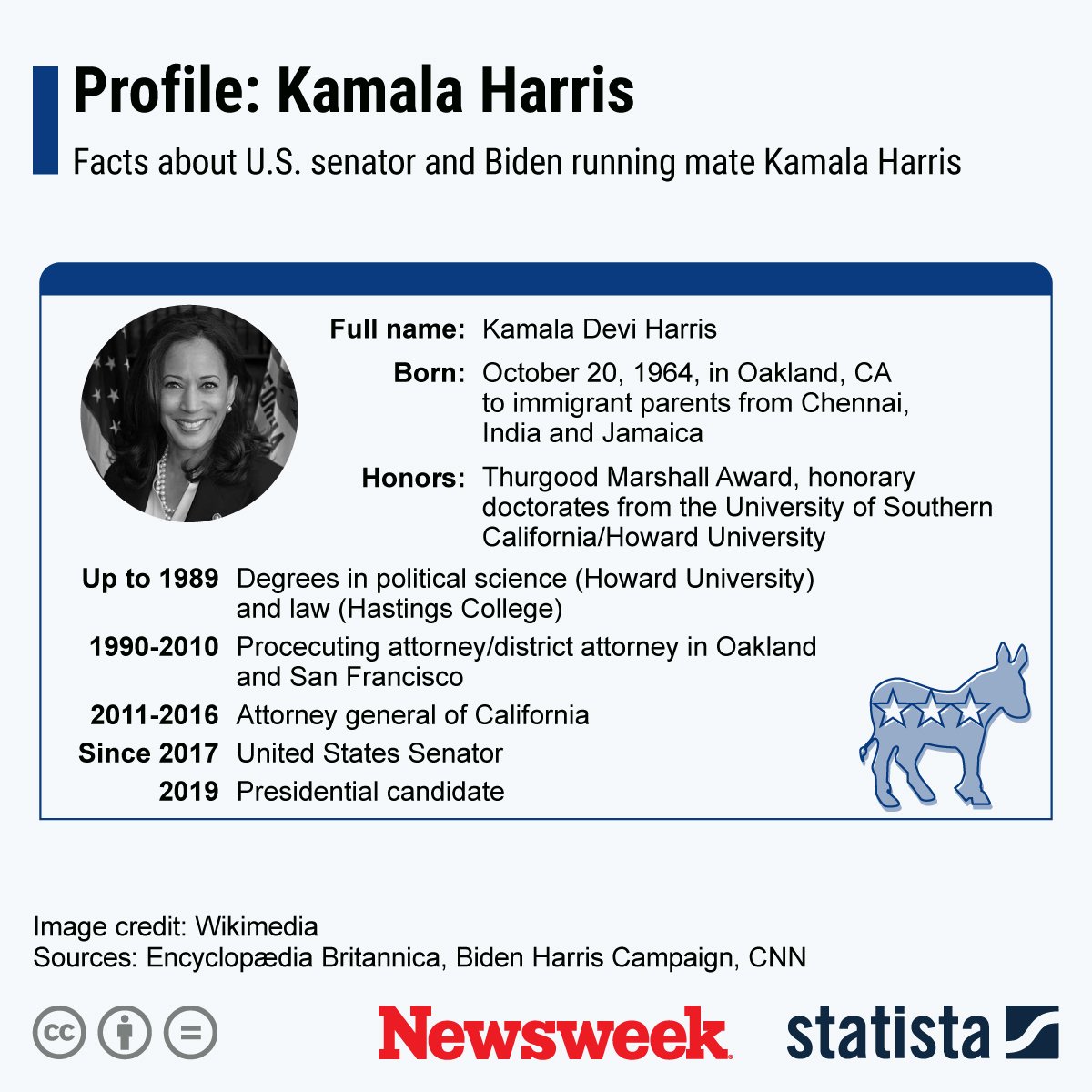The vice presidential debate on Wednesday was followed by a spike in people searching Google for Senator Kamala Harris, alongside the terms "nude," "bathing suit," and "bikini."
With less than a month to go until the presidential election on November 3, Harris debated Vice President Mike Pence for 90 minutes at the University of Utah in Salt Lake City on Wednesday.
According to Google Trends—a website run by the search engine that collects data on how popular search terms are around the world—there was a surge in people in the U.S. searching for "Kamala Harris bathing suit," "Kamala Harris Nude," and "Kamala Harris bikini" in the hours after the pair faced off.
Google Trends listed these as "rising related queries" for the search term "Kamala Harris" in the four hours pior to 7 a.m. ET. That means in the four hours before 7 a.m. ET, people searching for "Kamala Harris" also used the terms "bathing suit," "nude," and "bikini." "Rising" indicates that those search terms related to Kamala Harris saw the biggest spike compared to all others in that four hour period.
In contrast, related queries in the same period for Pence were "x men," "net worth 2020," and "HIV." X-Men likely refers to a meme comparing him to the comic book character Stryker, and HIV to his handling of Indiana's outbreak of the virus.

The vice presidential debate covered topics including the COVID-19 pandemic, and their respective running mates, president Donald Trump and former Vice President Joe Biden. Harris also sparked a meme and merchandise after she told Pence "I'm speaking" when he repeatedly interrupted her during the event.
The resultant searches appear to be an example of the sexist attitudes that female politicians have to deal with. A study published earlier this year in the Journal of Communication that reviewed existing research found that female politicians get less media coverage than their male counterparts, but when they are featured, more attention is given to their appearance and personal lives.
Research also suggests objectification can affect how they are perceived by the public. One study on 2008 vice presidential candidate Sarah Palin published in the Journal of Experimental Social Psychology found that objectifying Palin by focusing on her looks made her appear less competent and less "fully human" in the eyes of 133 participants. It also made volunteers less likely to vote for the McCain-Palin ticket in the 2008 presidential election.
A separate paper published in 2016 in the journal Communication Studies used Facebook to explore the effects of reducing a female political candidate to her physical attributes, and made similar findings. The researchers created two feeds to discuss a hypothetical female candidate. Both feeds focused on her policy credentials, but one included comments on her body. The team found views of the woman's credibility and suitability for office were affected when she was objectified.
Commenting on the Google searches, Jamie Goldenberg, a professor of psychology at the University of South Florida who co-authored the Palin study told Newsweek via email: "I am not aware of [the] search content, but clearly women in politics are objectified and sexualized. In two recent examples, both Sarah Palin and Hillary Clinton were objectified, that is, they were evaluated on the basis of their physical appearance.
"Clinton's criticism was often about not being feminine enough (recall the pantsuit), whereas Palin was more explicitly sexualized, similar to Kamala Harris, I believe, who even SNL referred to as 'The Hot Vice President In Charge' on Saturday night's episode."
Supriya Garikipati, associate professor in economics at the U.K.'s University of Liverpool, told Newsweek via email women in politics face "tremendous" challenges in terms of being regarded as "acceptable" and "likeable," as the idea of leadership in society continues to be "heavily masculinized."
Garikipati said: "A related idea is the difficulty society has in accepting a woman for simply her professional success. If she is also a successful wife and mother—then we begin to like her more. She 'ticks' our idea of womanhood. As a society, we place huge demands on women."
Jennifer Piscopo, associate professor of politics at Occidental College, told Newsweek the Google searches demonstrate a problem that goes beyond any individual person's sexual desire. Many sexualised images of female politicians that circulate online are fake, she said, with creators superimposing photos onto images of nudity.
"The circulation of these images is a widespread form of political disinformation that targets women," according to Piscopo.
She said: "Objectified and sexualized images of women politicians circulate online continually, so it's about the individuals that create and post these images in the first place. The 'content creators' aim to belittle and shame the individual woman, sending messages that politics is not a place for women and girls."
Here's what you need to know about the Democratic vice presidential nominee, in a graphic by Statista.

This article has been updated with a Statista graphic.
Uncommon Knowledge
Newsweek is committed to challenging conventional wisdom and finding connections in the search for common ground.
Newsweek is committed to challenging conventional wisdom and finding connections in the search for common ground.
About the writer
Kashmira Gander is Deputy Science Editor at Newsweek. Her interests include health, gender, LGBTQIA+ issues, human rights, subcultures, music, and lifestyle. Her ... Read more
To read how Newsweek uses AI as a newsroom tool, Click here.








